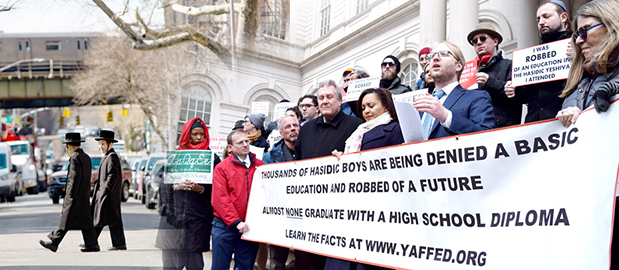Michael Hoban was an educator for 48 years, teaching at the elementary, high school and university levels. He was a university professor of mathematics for 35 years, is a Professor Emeritus at the City University of NY, and has lived in Lakewood for 14 years. Prof. Hoban is the senior educational consultant to Lakewood U.N.I.T.E., the group that advocates for minority families in Lakewood. This post originally appeared in the Asbury Park Press.
In the 7/24/2018 edition of the Asbury Park Press there was an article about a lawsuit being initiated in Brooklyn regarding whether a yeshiva is really a “school.”
In the article, a young man who was “educated” in such a yeshiva was quoted as saying that he was cheated out of a real education. The article stated that “[c]omplaints that (such) schools … barely teach English, math, science or social studies have fueled a movement to demand stricter oversight by state and local educational authorities.” And a group calling itself Young Advocates for Fair Education [Yaffed] is bringing a federal lawsuit pushing for “improved secular education in the ultra-Orthodox schools.”
The implication of this effort is: A yeshiva is a religious day-care center until it is proven to be a “school.”
Here in Lakewood, many residents have complained for years that many of these yeshivas are not “schools” at all – but merely religious day-care centers. Of course, many of us associate the term “day-care center” with pre-schools. But what else to call an entity that essentially provides all-day religious instruction to school-age children?
Some might question why ordinary citizens should care that some religious groups choose to deprive their children of a “real education?” The answer is two-fold.
- The Constitution of the state of New Jersey dictates that it is the responsibility of the state to ensure that! each child receives a “thorough and efficient” education. And it appears to be common sense to many that this can only be done where each “school” is in some manner “certified as a school” by the state.
- The second reason is far more pragmatic for most taxpayers. In Lakewood, for example, there are more than 100 yeshivas pretending to be “schools.” And the belief by many is that these day-care centers (many of them in private homes) have been removed from the tax rolls – impacting the tax burden for every taxpayer. Add to that that, as a “school,” taxpayers must pay for transporting children to these places at a cost of millions of dollars.
As a life-long educator (48 years) in both private and public schools, I am sympathetic to religious groups who wish to educate their children in their own schools. But it is also the duty of the state to ensure that these are really “schools” and are equipped to do the job.
I feel certain that some of the yeshivas in Lakewood could qualify as “schools” — judged by their curriculum and the preparation of their teachers. The problem is we simply do not know if this is true.
What should happen? There should exist a set of clear guidelines dictated by the state outlining what must exist for an entity to be declared a “school.” And then there should exist a clear process by which an entity seeks approval to operate as a “school” in the state of New Jersey – whether that entity be Christian, Jewish, non-denominational or whatever.
*Editor’s Note: for more on this subject, see here, here
, and here.



